- Home
- Dennis Lehane
Boston Noir 2 Page 13
Boston Noir 2 Read online
Page 13
Allister closed his eyes and laid his head against the back of his armchair and sighed a sigh that was almost a moan. Then he, too, rose and left the room.
Blanche was expecting Felicia to send for her and ask what had happened to Saxe's pictures. She was relieved when it didn't happen. Maybe she was wrong about those pictures. Maybe Ray-Ray had taken something of Allister's, as she'd first thought.
Allister was in the breakfast room when Blanche passed by on her way to the kitchen. She waited half a minute before she strolled past the breakfast room again. Allister was now in the sunroom leaning over the stand of African violets. She couldn't see his face, but she watched his hands as he slowly, gently removed browning leaves, moved pots from one spot to another, and brushed his fingers lightly against the blossoms. His body looked softer, more round, as if he'd been stiffening his spine and sucking in his gut until this moment when he thought he was alone. Like everybody else, Allister had more than one side, but she didn't think it mattered. Was a rattlesnake sunning itself all that much less dangerous than one on the hunt?
When Allister finally went upstairs to dress for dinner, Blanche waited again for shouts of "I've been robbed!" but all was quiet. Either Ray-Ray had pinched something of Allister's that wasn't obvious, or she'd been right the first time and it was Saxe's pictures he'd taken and Felicia just hadn't missed them yet.
* * *
The wind had died down by the time Blanche left work. The air was still on the cold side, but she could feel spring just waiting to burst out. She climbed the driveway and walked up Cottage Street—really a one-lane, one-way road.
This was the greenest part of the city she'd seen outside of Boston Common and the gardens downtown. It looked like country around here. Just like the Brindles' place, the few other houses along the road were all down in a kind of valley tucked away out of sight behind stone or wooden fences. Following Inez's directions, Blanche turned left at the top of the hill and followed a two-lane road until it turned into Perkins Street, where she saw the lake she'd noticed on the way in. The sign she passed said brookline, and she realized the Brindle house was about three blocks outside the city of Boston.
But she'd crossed the line and was back in Boston now. Another sign announced that the lake was called Jamaica Pond, which told her she must be in the Jamaica Plain section of Boston.
Her regular jobs took her into the South End, Back Bay, and Beacon Hill, but she'd never been here before or to other neighborhoods like East Boston, Charlestown, South Boston, or the North End. Somebody had told her that some of these places had once been separate towns, but that was a long time ago. From what she heard and read, the major use of these neighborhood names now seemed to be to keep people apart and suspicious of one another. And she knew there were Boston communities unfriendly to folks from outside, particularly black, brown, and yellow folks.
From where she now stood, she couldn't see the other side of the pond. Canada geese and ducks skimmed along its surface. People strolled, jogged, and pushed strollers on the path beside the pond. Blanche stretched out her arms to the greening trees and blue water. She missed all of this over in the part of Roxbury where she lived. There were some trees on its streets, but if there were any bodies of water in the neighborhood, besides public pools and mud puddles, she'd never heard about them.
She'd been in Boston nearly three years, but having to build up her clientele and take care of the kids and the house, along with winters that demanded she stay indoors as much as possible, had reduced her learn-about-Boston time down to about six months. Still, she hadn't even done six months worth of exploring. Maybe it was because she hadn't had much choice about moving here. It was not so much her idea as her only alternative: she'd needed to get out of Farleigh in a hurry, and Cousin Charlotte had been able and willing to help her out. Blanche would have left Boston by now if it weren't for Taifa and Malik. They'd been in three different school systems in as many years. It didn't feel right to ask them to move again.
She waited for the light to change at Jamaica Way and Perkins Street, where the traffic was moving at expressway speed. She looked down Jamaica Way with its huge houses on one side and the pond on the other. Nice. When the light changed, she hurried across and walked on toward Centre Street, where she'd get the bus. It was a longish walk. Miz Inez had offered her banged-up car, but Blanche had seen enough of Boston driving to know she didn't want to be on the road unless she had to. Anyway, her fast-approaching-fifty-year-old body could use the exercise.
She walked up Perkins Street, past big old houses that were now apartments, and over to Centre Street, where the store signs and street language were in Spanish, past the Bromley-Heath projects to the Jackson Square bus depot next door. She was on the tip of Roxbury now. She got the number 44 bus and let her mind slip back to the other events of her first day on Miz Inez's job.
Lord! Had she really poked that man? She had a feeling she'd be hearing about that. Shit! And didn't Ray-Ray have a nerve, which was probably one of the reasons she liked him in spite of herself. A poor black person without nerve was a dead person. But that didn't mean she approved of his sneaking onto his mother's job to steal something, which was the only reason she could think of for him sneaking around upstairs. From what Carrie said, he was definitely no stranger to the house, but if he hadn't worked for the Brindles for at least a year, why hadn't Carrie or Wanda found his shirt and given it to Miz Inez to take home, and what did Ray-Ray mean when he said she'd be glad he came? She still didn't know what he'd been doing in the Brindle house, but she knew his shirt didn't have doodly-squat to do with it. Maybe Saxe's pictures did, although it was hard to figure out how Ray-Ray would know Saxe had left them there. But she definitely intended to ask Ray-Ray about those pictures the next time she saw him. And that Carrie! Her and her pastor and her thing for "Mr. Saxe!" Lord! did she have stories to tell Ardell. Blanche got off the bus on Humboldt and walked up the street to Rudigere Homes, eager to be on her own turf.
THE BALANCE OF THE DAY
BY GEORGE V. HIGGINS
Roxbury
(Originally published in 1985)
John Lynch turned left off Washington Street onto Boswell and found number 27 among the neat three-deckers by driving slowly between the parked cars until he saw the '51 Ford coupe, black, listing to port on a flat rear tire next to the pillared porch. There were two faded bumper stickers plastered to the trunk, one on either side of the lock, each reading: "Support the Blanket Men." Lynch without stopping continued on up the street toward where it intersects with Centre, turned right, and headed east toward Jamaica Plain. He angle-parked the lime-green '85 Ford sedan at the curb in front of a block of stores next to a Getty station, about a mile from Boswell, and shut the engine off. In the rearview mirror, he could see another block of stores across the street.
There was a small variety store directly in front of him. A man about seventy, carrying a newspaper and a cardboard container of coffee, came out into the spring morning onto the sidewalk. He glanced casually at Lynch's car, and headed west on foot. When he reached the lunchroom at the end of the block, he went inside.
Lynch sighed and switched his gaze back to the window of the variety store. In approximately forty seconds, a man about fifty in a white shirt open at the collar peered through the plate glass at Lynch's car. He scowled. He came out onto the sidewalk and looked up at the sky like an air raid warden. Then he looked directly at Lynch through the windshield of the Ford and scowled again. He went back into the store. A few more seconds passed and Lynch saw him come to the window. He had a telephone in his left hand, the coiled cord stretching out behind him. He spoke with vehemence that Lynch could not hear, nodding vigorously. When the conversation was evidently complete, he lowered the phone and stood staring at Lynch. He pantomimed spitting. Then he disappeared into the deeper gloom of the store.
After about five more minutes a blue '84 Ford sedan carrying three men came up Centre Street, heading west, and pulled into a p
arking place on the opposite side of the road. Lynch through his rearview mirror watched the brake lights go off. He waited thirty seconds. No other cars passed on Centre Street. He leaned over the passenger seat, opened the glove box, took out the microphone, pressed the transmitting button, sighed again, grimaced, and put the mike back, shutting the box as he straightened up.
Lynch got out of the green Ford, locked it, hitched up his pants, buttoned his blazer, and after looking both ways crossed Centre Street to the blue Ford. He got into the backseat on the right and closed the door behind him.
The driver met his gaze in the rearview mirror. The front-seat passenger turned so that his left elbow rested on the back of the seat and he could look at Lynch directly. He had a trace of a smile on his face. "Now are you impressed?" he said.
"I certainly am," Lynch said. "I realize those guys've been at it for a long time now. But after all, they're getting old. You'd think they'd've slowed down a little by now. What are they, crowding eighty?"
The other man in the backseat snickered. "How you think they got to be eighty, John?" he said. "Not by being careless." He was about fifty-five. He had iron-gray hair and he looked resigned.
"Besides seeing them make you in record time, John," the front passenger said, "what else did you see? Get anything?"
Lynch shrugged. "Nothing the Judge'd turn cartwheels to read. The old car's in the driveway, with the stickers on it. Looks like it hasn't been driven for years, but that's probably a decoy. Old Sean's probably got a bulletproof Cad in the barn with a couple of Sidewinder pods, case he feels like going out."
"Unlikely," the front passenger said.
"Yeah," the man in the backseat said. "Sean's legs're giving out. He doesn't go out much alone. Needs someone to steady him."
"Well," Lynch said, "why's he need to, now I think of it? Network he's got working, what's the point of going out? Just stay inside, give orders, monitor the street, make sure nobody does nothing he doesn't know about. He's got the scanner, by the way. You can only see a little bit of the lead coming out of the window in the front room on the third floor, and most of it's hidden behind the shutter until it gets to where they had to cross it over and hide it behind the drainspout before they could drill a hole through the eaves and get it back into the attic. But it's there all right. Wonder how many crystals he's got for that thing. Hundred be a good guess?"
"Nah, way too high," the man in the backseat said. "Why'd he need that many? One for Boston, one for State, one for us, one for MDC that he probably doesn't use. Say, a half a dozen spares, plus a couple or three old ones that he took out a year ago, when we changed frequencies. I'll bet old Sean hasn't got more than a dozen of the things." He snickered again. "Old bastards weren't so damned and determined to spend everything they get on guns and ammunition, he'd be computerized. Except probably not, now I think about it. For that he probably is too old. Doesn't trust anything invented since gelignite."
"Don't be too sure of that, Nick," the driver said, craning his neck to see the man in the back through the mirror. "Last shipment had ten Redeyes in it. BOAC isn't nervous because these guys use bows and arrows, you know. They're sophisticated."
"Your thoughts, John," the front passenger said.
"We know what Sean is doing," Lynch said. "We know he's some sort of guru to the money-raisers. We know the money-raisers are raising money. We know they're bringing it to him. We know the old bombthrower's sitting there and ordering the ordinance."
"Ordnance," Nick said absently.
"Huh?" Lynch said.
"Ordnance," Nick said. "I assume you mean: cannons and rockets and rifles and sidearms, and the ammunition for those things. 'Ordnance.' 'Ordinance' is different. Says you can't leave your dog run loose. City ordinance: 'Leash your mangy dog.' Army ordnance: 'Bazookas.' Not the same thing at all."
"Whatever," Lynch said impatiently.
"Right," Nick said.
"We get into that house," Lynch said, "we have got a pretty decent chance of intercepting either a whole bunch of money or a whole bunch of weapons that're headed for someplace that the Judge doesn't want them going."
"We get into heaven," the driver said, "we don't have to worry about any of this crap anymore. We can all retire to Florida where it's warm all the time, and play a little golf."
"I don't see what that's got to do with anything," Lynch said.
The front passenger sighed. "Your thoughts, John," he said again.
"The people on the first floor work," Lynch said. "Both of them work days. Cornelius Finn and his child bride, the lovely Mary Anne. Connie's down at Sawyer Steel. She's at Mass. Rehab. We have a little weight with Connie—least I think we do. Brother Andrew's on parole. He's working nights at Daley's and he's seeing the wrong guys. I could tell Connie, as a favor, 'Baby brother's gonna fall, you don't do me a favor.'"
"And what might this favor be?" Nick in the backseat said. "You think if you can't drive by the house once without getting spotted, you can sneak into the place and set up shop? Sean'd have you made in ten seconds. The last time somebody sneaked onto Sean Geogan's turf without getting made was in 1916, before the moon rose. And what'd you do once you got in there? Hold a housewarming and invite him? Say you're the new boyo in town, want to get acquainted?"
"Well," Lynch said, "we have got the junction box in the basement under the pantry floor, you know. Get one of Lester Daley's magicians in there with a spool of wire and a bitstock, might be able to pick up some interesting stuff on the phone."
"Won't work," the front passenger said. "One thing they have got for modern improvements is state-of-the-art sweepers. He'd pick up the drain on the first call he made."
Nick snorted in the backseat. "No, he wouldn't, Ernie," he said. "There wouldn't be any first call on that phone after the wire went on. The last call on that line would've been made fifteen seconds after John got finished putting the hammer on Connie down at Sawyer Steel. Sean's friends'd spend the next afternoon and evening bringing in carrier pigeons and putting them in the attic next to the scanner antenna. You'll get more out of wiring a rock'n you will out of tapping Sean's phone."
Lynch sighed again and squared his shoulders. "Oh-kay," he said. "The second floor. The second floor occupants are Tom and Kathy Dolan and their two lovely children, Brian and Kate. Tom I sort of know. He was two years ahead of me in school. He's got a department-head job in the schools. He's got something to lose. Assistant superintendency, I hear, may be coming up. Kathy? Same sort of thing. Very hardworking lady. Busts her hump down at the Brigham, working Night Emergency. Those people've got something at stake, that old Bolshevik gets busted or bombed out on the top floor of their house."
"How do you know Kathy?" Nick said, looking interested and skeptical at the same time.
"Well," Lynch said, "I don't. Not personally, at least. But I ran her through the computer, you know, and I got all this stuff, and I know her type. I know what she'll do."
"Right," Nick said. He put his left hand under his chin and cupped his fingers over his mouth.
"You think I'm wrong?" Lynch said. "You think I don't know what I'm talking about?"
Nick removed his hand from his face. "Frankly," he said, "yes."
"Nick," Lynch said, "all right? Have you ever seen Sean Geogan? Have you ever laid eyes on the man? Personally?"
Nick shook his head. "Nope," he said. "I know what he looks like. I have seen his picture and he looks like Captain Kangaroo, only smaller and without the hair. But personally? No, I have not."
"That's what I thought," Lynch said smugly.
"It's no disgrace, John," Nick said. "Thousands of British soldiers have never laid eyes on Sean Geogan, and they've been trying for more than sixty years. Very hard, too. Very hard. I've just never felt the need that bad."
"Well," Lynch said, "I have."
"And you're going to again, too," Nick said.
"I hope so," Lynch said.
"Bank on it," Nick said.
"The way I
look at this approach," Lynch said, speaking earnestly to the front passenger, "and not that it's basically different from the idea I had with the Finns, but we just sort of approach them and tell them, you know, this is how it's going to be. And these people are not gunmen. I mean, it's one thing you've got this old revolutionary living on the top floor of your house and all, and maybe you think that's amusing. But people are dying in Ireland today because of him and his kind, and we want to stop it. And we're going to stop it. 'And if you, Kathy Dolan, and you, Thomas Dolan, don't cooperate with us in this, we're going to cause you come inconvenience.'" He turned toward Nick. "And like I say, Nick, I know these people. I know what they will do."
"I think you're wrong," Nick said. "I don't think Kathy Dolan will do what you expect. Not if she is the Kathy Dolan that I think she is. Which is the former Kathy Brennan, daughter of State Representative Edmund and his lovely wife, Rosemary, both of them deceased. Tragic highway accident in Saugus, back in 1969, if I recall. Edmund was shitfaced. Both under forty, too, I think. Really a tragic thing. Leaving a little babe like that, almost alone in the world."
"I guess that's right," Lynch said, perplexed. "I didn't look it up, of course, but that does sound right."
"Take his word for it, John," the front passenger said firmly. "Nick has blown his share of details, but never one like this."
"Thank you, Ernie," Nick said. "Always like a word of praise. Rosemary Brennan, John, Kathy Brennan's mother, had a maiden name of Keating. Father's name was Ted, I think—his brother's name was John.
"John and Ted came here from Galway back in 1921. It's reported that they traveled across the pond in crates shipped as cargo in the hold of a tramp freighter out of Liverpool—no passengers on her manifest. Their law-abiding friends assure us that the Keatings traveled in those spartan accommodations because they were poor farm lads who had no money for their passage to the promised land. Their detractors have more exciting explanations which describe bridges blowing up and similar events that attracted the attention of the soldiers of the Crown. Who became so anxious to talk to the Keatings that they thought they'd better leave.

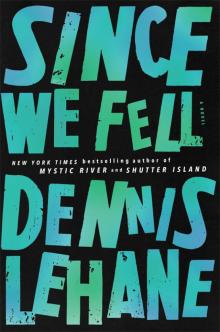 Since We Fell
Since We Fell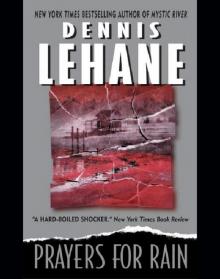 Prayers for Rain
Prayers for Rain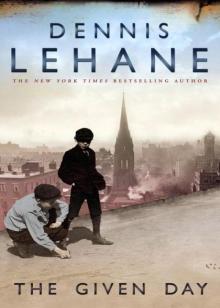 The Given Day
The Given Day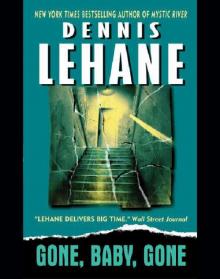 Gone, Baby, Gone
Gone, Baby, Gone Mystic River
Mystic River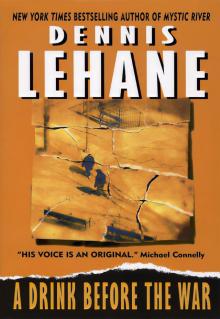 A Drink Before the War
A Drink Before the War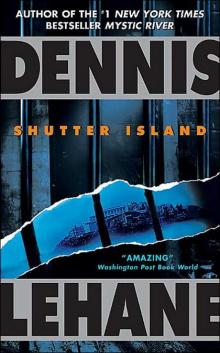 Shutter Island
Shutter Island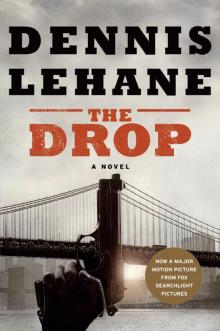 The Drop
The Drop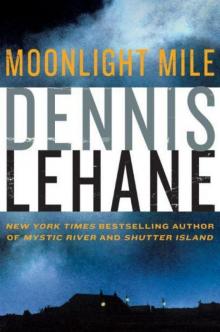 Moonlight Mile
Moonlight Mile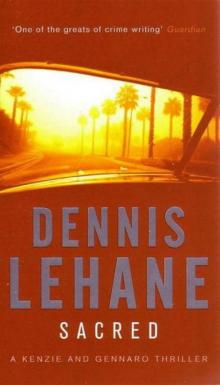 Sacred
Sacred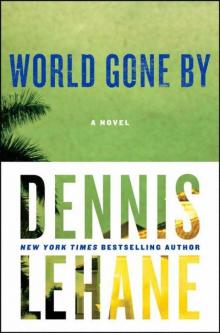 World Gone By
World Gone By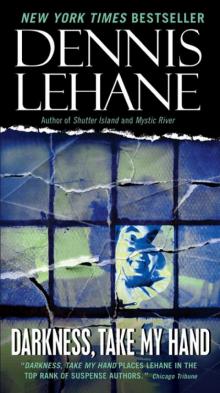 Darkness, Take My Hand
Darkness, Take My Hand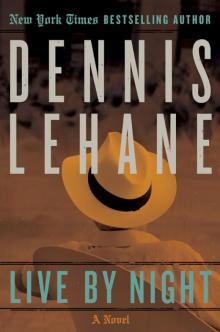 Live by Night
Live by Night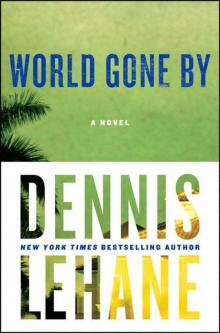 World Gone By: A Novel
World Gone By: A Novel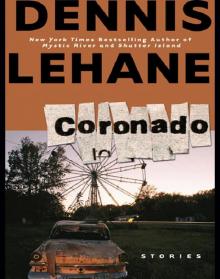 Coronado
Coronado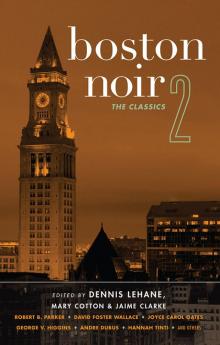 Boston Noir 2
Boston Noir 2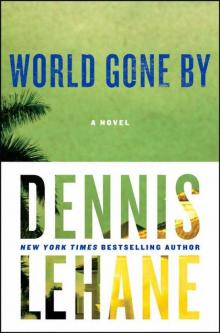 World Gone By: A Novel (Joe Coughlin Series)
World Gone By: A Novel (Joe Coughlin Series)